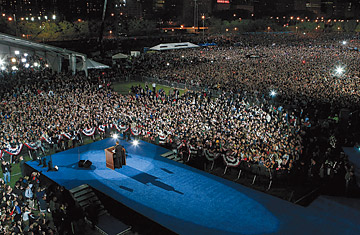
The scene in Chicago during the exuberance of election night 2008.
(2 of 5)
In America, political majorities live or die at the intersection of two public yearnings: for freedom and for order. A century ago, in the Progressive Era, modern American liberalism was born, in historian Robert Wiebe's words, as a "search for order." America's giant industrial monopolies, the progressives believed, were turning capitalism into a jungle, a wild and lawless place where only the strong and savage survived. By the time Roosevelt took office during the Great Depression, the entire ecosystem appeared to be in a death spiral, with Americans crying out for government to take control. F.D.R. did--juicing the economy with unprecedented amounts of government cash, creating new protections for the unemployed and the elderly, and imposing rules for how industry was to behave. Conservatives wailed that economic freedom was under assault, but most ordinary Americans thanked God that Washington was securing their bank deposits, helping labor unions boost their wages, giving them a pension when they retired and pumping money into the economy to make sure it never fell into depression again. They didn't feel unfree; they felt secure. For three and a half decades, from the mid-1930s through the '60s, government imposed order on the market. The jungle of American capitalism became a well-tended garden, a safe and pleasant place for ordinary folks to stroll. Americans responded by voting for F.D.R.-style liberalism--which even most Republican politicians came to accept--in election after election.
By the beginning of the 1960s, though, liberalism was becoming a victim of its own success. The post--World War II economic boom flooded America's colleges with the children of a rising middle class, and it was those children, who had never experienced life on an economic knife-edge, who began to question the status quo, the tidy, orderly society F.D.R. had built. For blacks in the South, they noted, order meant racial apartheid. For many women, it meant confinement to the home. For everyone, it meant stifling conformity, a society suffocated by rules about how people should dress, pray, imbibe and love. In 1962, Students for a Democratic Society spoke for what would become a new, baby-boom generation "bred in at least modest comfort," which wanted less order and more freedom. And it was this movement for racial, sexual and cultural liberation that bled into the movement against Vietnam and assembled in August 1968 in Grant Park.
Traditional liberalism died there because Americans--who had once associated it with order--came to associate it with disorder instead. For a vast swath of the white working class, racial freedom came to mean riots and crime; sexual freedom came to mean divorce; and cultural freedom came to mean disrespect for family, church and flag. Richard Nixon and later Reagan won the presidency by promising a new order: not economic but cultural, not the taming of the market but the taming of the street.
The Receding Right
